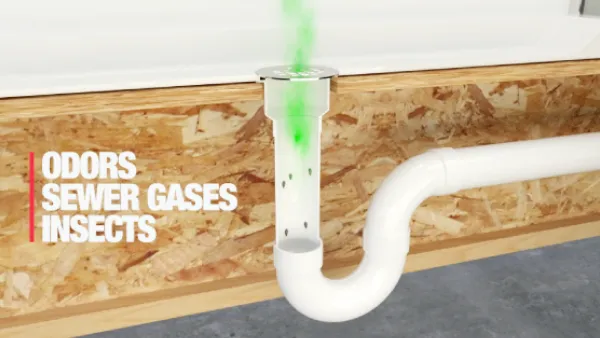Last Updated on November 14, 2023
Most homeowners aren’t aware of the negative effects of sewer gas in their bathrooms. But the real concern is, is it dangerous to breathe in the sewage smell in the bathroom?
Your exposure to the sewage smell in your bathroom can be dangerous. High exposure to sewer gas can lead to Hydrogen sulfide (H2S) poisoning, a serious health concern.
Inhaling sewer gas can irritate your mouth, nose, throat, lungs, and eyes. These symptoms can be quite uncomfortable and can affect your overall health.
We’ll talk about the potential hazards of sewage smell and the symptoms you should watch out for through this article. Also, we’ll discuss whether bleach can effectively eliminate the unpleasant odor.
Why Breathing Bathroom Sewage Smells Dangerous?

Breathing in the bathroom sewage smell can expose you to several health hazards.
1. Hydrogen Sulfide (H2S) Poison
When exposed to sewage smells in your bathroom, you may be at risk of health hazards due to the potential poison exposure of hydrogen sulfide (H2S). Sewage gas often contains high concentrations of hydrogen sulfide, which can be highly toxic.
Breathing in excessive amounts of hydrogen sulfide can lead to various symptoms, such as headaches, nausea, dizziness, and, in severe cases, loss of consciousness. Prolonged exposure to high levels of H2S can even be life-threatening.
2. Ammonia Exposure
If you frequently inhale the odor of bathroom sewage, your health may be compromised by exposure to ammonia. Ammonia is a gas found in sewage that can lead to eye irritation, coughing, and shortness of breath.
Prolonged exposure to ammonia can also cause more severe respiratory issues such as bronchitis and pneumonia.
3. Methane Gas
Methane is a potentially harmful gas in sewage that can harm your health. When inhaled in large amounts, methane can displace oxygen in the air, leading to asphyxiation and oxygen deficiency. This is because methane can bind to hemoglobin in your blood, preventing oxygen transport to your body’s cells.
As a result, your body may not receive sufficient oxygen, leading to dizziness, shortness of breath, and even loss of consciousness.
4. Airborne Particulates
Sewage odor contains tiny particles that can irritate your respiratory system when inhaled. These airborne particulates can lead to respiratory problems, especially if you have preexisting conditions such as asthma or chronic obstructive pulmonary disease (COPD).
The irritants present in sewage odors can worsen the symptoms of these conditions and may even trigger respiratory distress. Continuous exposure to these particulates can further exacerbate respiratory issues, causing long-term lung damage.
5. Toxic Chemicals
Sewage contains volatile organic compounds (VOCs) and toxic chemicals, including industrial and household pollutants. These substances can adversely affect your health if inhaled, absorbed through the skin, or ingested through contaminated food or water.
VOC exposure can cause respiratory problems, such as coughing, wheezing, and shortness of breath. It’s possible to get cancer and organ damage from toxic chemicals in sewage, like heavy metals and pesticides.
How long does it take to get sewer gas poisoning?
It only takes a few minutes of exposure to sewer gas to risk poisoning. Sewer gas primarily consists of hydrogen sulfide, a highly toxic gas. Breathing in very high levels of hydrogen sulfide can lead to death within just a few breaths. Loss of consciousness may occur after one or more breaths at this level of exposure.
However, note that such high levels of exposure aren’t expected in a home environment but rather in certain workplaces where sewer gas may accumulate. In homes, sewer gas concentration is usually lower, but prolonged exposure can still be harmful.
What are the symptoms of sewer gas poisoning?

The manifestations of sewer gas poisoning can vary depending on the concentration and duration of exposure. Common symptoms include:
- Nausea or vomiting
- Headaches
- Lightheadedness
- Fatigue
- Coughing and shortness of breath
- Poor memory and concentration
- Eye irritation
These symptoms may occur immediately after exposure or develop over time. It’s crucial to seek medical attention if you experience these symptoms, especially if they persist or worsen.
Is it safe to stay in a house with a sewage smell?
Staying in a house with a sewage smell can pose significant health risks due to the potential release of physical and airborne contaminants. Sewage odors often indicate a problem in the plumbing or sewage system, and they should not be ignored.
If left untreated and ignored for an extended period, inhaling sewage odors can have severe and life-threatening consequences. The contaminants in sewage can lead to chronic health problems and may eventually lead to death in extreme cases.
Will Bleach kill the sewer smell in the bathroom?
If you’re dealing with a persistent sewage smell in your bathroom, bleach can efficiently neutralize the odor. Bleach can kill the majority of odor-causing bacteria that may be present in your bathroom. These bacteria can thrive in moist environments and contribute to the foul smell.
Can I get sick from long-term breathing in sewage?
Long-term exposure to sewage, specifically the gasses it emits, can have various negative health effects. Sewage contains a variety of potentially harmful gasses, and consistent inhalation of these gasses over an extended period can lead to several health issues.
Prolonged exposure to sewage gasses can lead to chronic fatigue. This is likely due to the body’s efforts to process and eliminate toxic substances in the gasses. Also, irritation of the eyes is a common symptom of sewer gas exposure. Compounds in the gasses can irritate the eyes, causing discomfort and redness.
Address Bathrooms Sewer Gas Poisoning to Protect Your Health
Sewer gas poisoning is a great concern, given the potential health risks associated with exposure to toxic gasses from sewage systems.
You must address the issue of sewage smell in bathrooms as it can pose health hazards. Breathing in these odors can lead to sewer gas poisoning, which can cause various symptoms, including dizziness, nausea, and headaches.
It’s necessary to address this issue promptly to ensure the well-being of individuals using the bathroom. Also, using bleach can effectively eliminate the sewer smell and maintain a safe and hygienic environment.

